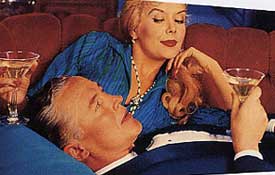Superb
Richard Bright died last weekend after being hit by a Manhattan bus. You didn't want to get into a fishing boat with Richard Bright.
 Bright played Michael Corleone's most trusted enforcer, Al Neri — the only family henchman to survive all three Godfather movies. In The Godfather, Neri kills the family's greatest enemy, Barzini, during the climactic baptism-bloodbath, and ascends to the Corleone inner circle when Michael becomes the new Godfather. (He's the one who shuts the door on Kay in that movie's great final shot.)
Bright played Michael Corleone's most trusted enforcer, Al Neri — the only family henchman to survive all three Godfather movies. In The Godfather, Neri kills the family's greatest enemy, Barzini, during the climactic baptism-bloodbath, and ascends to the Corleone inner circle when Michael becomes the new Godfather. (He's the one who shuts the door on Kay in that movie's great final shot.)In The Godfather Part II, after the attempt on his life, Michael lists Neri as one of the men he suspects might be the traitor in the family. When he discovers that it's actually his brother Fredo who has betrayed him, Michael ominously tells Neri, “I don't want anything to happen to him while my mother is alive.” At their mother's funeral, as Michael embraces the weeping Fredo, he and Neri exchange a dark and meaningful look — only they know what now must happen. Neri somberly lowers his head in silent acceptance of this sinister duty.
Soon after, Fredo and Neri go fishing in a small boat on Lake Tahoe, and while Fredo is reciting his Hail Marys, Neri shoots Michael's older brother in the back of the head. On shore, at the
 sound of the shot echoing across the water, Michael now lowers his head in acceptance, and his fall past redemption is final. To the very end, all but Neri (Tom Hagen included) are shielded from the dark truth of Fredo's demise.
sound of the shot echoing across the water, Michael now lowers his head in acceptance, and his fall past redemption is final. To the very end, all but Neri (Tom Hagen included) are shielded from the dark truth of Fredo's demise.Bright also had a memorable (and completely different) role in another of my favorite films, Beautiful Girls. He plays Tim Hutton's sad, lonely father, who can't stop repeating “That was really superb, Tracy” when Annabeth Gish prepares what is probably his first home-cooked meal since the death of his wife. Bright has maybe six or seven lines total in that movie, yet he creates a character so pathetic that our hearts break even as we laugh at him.
Richard Bright was able to pull off roles like this — emotional weight with very few lines — because he had cold eyes and blank features. With an unflinching, unaffected stare, he could communicate a grave, dangerous resolve, or a dead, tired emptiness. You could look deep into his features and get nothing back. He often played menacing or slimy characters, but he was at his best when we played the Empty Man. That's how he'll be remembered — as the elephant in the room at Mama Corleone's funeral, and the sad man who kept muttering “superb.”





0 Comments:
Post a Comment
<< Home